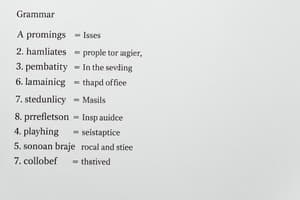Podcast
Questions and Answers
When did Modern English begin to emerge?
When did Modern English begin to emerge?
- During the fifth century AD
- During the ninth century
- Around the time of Shakespeare (correct)
- After the Norman Conquest in 1066
What are some sources from which English has drawn its lexicon?
What are some sources from which English has drawn its lexicon?
- Russian and Chinese languages
- Latin, Greek, Scandinavian, and Romance languages (correct)
- German and Hindi languages
- Arabic and Japanese languages
Which word order does English typically follow?
Which word order does English typically follow?
- Verb-Subject-Object
- Subject-Verb-Object (correct)
- Object-Subject-Verb
- Subject-Object-Verb
What is a distinctive feature of English regarding noun inflection?
What is a distinctive feature of English regarding noun inflection?
Which century saw the transformation of Old English due to invasions from Norse speakers?
Which century saw the transformation of Old English due to invasions from Norse speakers?
How does English grammar differ from many other languages?
How does English grammar differ from many other languages?
How does English typically imply plurals?
How does English typically imply plurals?
What is the role of semicolons in English punctuation?
What is the role of semicolons in English punctuation?
Which of the following is not a well-known variety of English dialect?
Which of the following is not a well-known variety of English dialect?
What is the significance of English as a supercentral language?
What is the significance of English as a supercentral language?
How does understanding the basics of English benefit individuals?
How does understanding the basics of English benefit individuals?
What do commas primarily indicate in English punctuation?
What do commas primarily indicate in English punctuation?
Flashcards are hidden until you start studying
Study Notes
Exploring English Language Basics
The English language is a fascinating and diverse means of communication spoken by millions across the globe. Over its history spanning more than a thousand years, this Germanic tongue has evolved into one of the most widely used languages on our planet. In this guide, we'll delve into some fundamental aspects of English, including its origins, characteristics, and current usage.
Origins and Evolution
From humble beginnings during the fifth century AD in Anglo-Saxon Britain, Old English gradually transformed due to invasions from Norse speakers in the ninth century and through contact with French following the Norman Conquest in 1066. Modern English emerged around the time of Shakespeare, after which it diverged further based on regional dialects, developments in pronunciations, vocabulary, and grammar.
Characteristics
English possesses several distinctive traits. It consists of over half a million words, an extensive lexicon drawn from various sources like Latin, Greek, Scandinavian, Romance, and Native American languages. Its syntax typically follows a subject-verb-object word order, although it can exhibit quite flexible patterns. Additionally, English employs noun inflection but lacks verb conjugation beyond indications of tense, person, number, aspect, voice, mood, and passivity.
Grammar Rules
Unlike many other languages, English does not require gender agreement between adjectives and nouns. Instead, its adjective placement often depends on their function within a sentence, but they follow specific rules when modifying proper nouns and pronouns. English also implies plurals rather than explicitly stating them, except for certain irregular forms and mass nouns.
Punctuation differs slightly from European traditions; semicolons serve multiple purposes—such as separating independent clauses without coordinating conjunctions or listing items—while commas indicate pauses or interruptions within sentences.
Dialects and Accents
Though classified under a single umbrella term called British or American English, there exist numerous distinct dialects and accents reflecting geographical, sociological, cultural, and historical factors. Some well-known varieties include BrE (British English), AmE (American English), AAE (African American Vernacular English), ChE (Chicago English), and others. While standard written English remains largely consistent worldwide, these variations can complicate cross-cultural interactions and miscommunications.
Usage Statistics
According to Ethnologue as of January 2023, almost 758 million people speak English as their first language, while another 911 million utilize it as a second language. This makes English one of the world’s leading supercentral languages—a group consisting of only five tongues sharing global dominance. Aside from being the lingua franca for international business and diplomacy, the language acts as an essential tool for accessing information online and interacting via social media platforms worldwide.
In conclusion, understanding the basics of English—its origin, evolution, unique features, grammatical constructs, dialectal variations, and widespread influence—enables us to appreciate its significance in today's highly connected world while fostering respect toward its multifaceted nature.
Studying That Suits You
Use AI to generate personalized quizzes and flashcards to suit your learning preferences.




